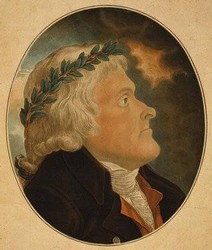Thomas Jefferson Ideas
|
| updated |
Copy Link Code
|
 Thomas Jefferson's accomplishments were not only political in nature. The premier polymath of colonial Virginia, Jefferson was a renowned architect, botanist, linguist and theologian. As a leading member of the Enlightenment in its American conception, the significance of Thomas Jefferson can not be defined solely by his impact on the structure of government. Certainly, the political achievements of Thomas Jefferson are huge and incredibly relevant; he was the chief author of the Declaration of Independence, the first Secretary of State, Vice President to the John Adams and the third President of the United States serving two terms. That is not to mention the major accomplishments of Thomas Jefferson in the legal system and legislature of his home state. But it is equally important to remember the man behind the political legacy, because we can only understand his political ideals fully if we know forces that drove his ideology.
Thomas Jefferson's accomplishments were not only political in nature. The premier polymath of colonial Virginia, Jefferson was a renowned architect, botanist, linguist and theologian. As a leading member of the Enlightenment in its American conception, the significance of Thomas Jefferson can not be defined solely by his impact on the structure of government. Certainly, the political achievements of Thomas Jefferson are huge and incredibly relevant; he was the chief author of the Declaration of Independence, the first Secretary of State, Vice President to the John Adams and the third President of the United States serving two terms. That is not to mention the major accomplishments of Thomas Jefferson in the legal system and legislature of his home state. But it is equally important to remember the man behind the political legacy, because we can only understand his political ideals fully if we know forces that drove his ideology.
In the eulogistic words on his tombstone written by Thomas Jefferson, contributions he selected to note were only three: author of both the Declaration of Independence and Virginia Statute of Religious Freedom as well as founder of the University of Virginia. In the relevance given to these three accomplishments by Thomas Jefferson himself, we can see what he felt was most important. It was his preamble to the Declaration of Independence that sprung Jefferson to immortal fame, and he was proud of bringing the inspiration of liberty to so many Americans in his own time. With great understanding of history and human conflict, Jefferson knew that religious freedom was key to building a working democracy of such diverse religious backgrounds. Throughout the life of Thomas Jefferson, ideas of the perfect college nagged at him until he had retired from politics and had the time to design one. Every part of the campus at the University of Virginia and its "Academical Gardens" was engineered by Jefferson to provide the best environment for students to explore their curiosity. Unlike every other college of the time, the University was built around a Library instead of Church and had no ties to any religious denomination; theology was not offered as a subject until years later. In his pride as a founder, we can see that Jefferson felt strongly about public education and held a very scientific understanding of the world around him.
In the federal career of Thomas Jefferson, accomplishments during presidency include the Louisiana Purchase, the Lewis and Clark Expedition and the famous attack on the Barbary pirates on the shores of Tripoli. He also managed to assuage fears among Federalists that he would use his executive powers to retaliate for the oppressive measures, such as the Alien and Sedition Acts, that they had imposed upon dissidents in the previous administration. In the eyes of Thomas Jefferson, works of compromise were the key to democratic government and he allowed a number of moderate Federalists to retain non-Cabinet posts in his administration, further withering away the support for so-called High Federalists such as John Adams and Alexander Hamilton. In the long list of accolades given to Thomas Jefferson, awards include a large memorial in the nation's capital.
